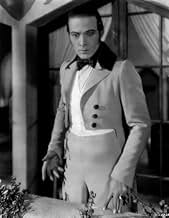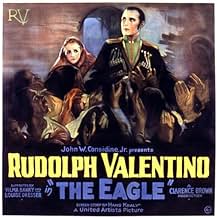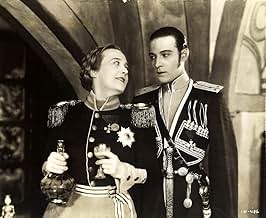NOTE IMDb
6,6/10
2,4 k
MA NOTE
Un lieutenant russe recherché devient un justicier masqué cherchant à se venger de l'homme qui a volé les terres de sa famille, avant de tomber amoureux de sa charmante fille.Un lieutenant russe recherché devient un justicier masqué cherchant à se venger de l'homme qui a volé les terres de sa famille, avant de tomber amoureux de sa charmante fille.Un lieutenant russe recherché devient un justicier masqué cherchant à se venger de l'homme qui a volé les terres de sa famille, avant de tomber amoureux de sa charmante fille.
- Réalisation
- Scénario
- Casting principal
- Récompenses
- 2 victoires au total
Vilma Bánky
- Mascha Troekouroff
- (as Vilma Banky)
James A. Marcus
- Kyrilla Troekouroff
- (as James Marcus)
Spottiswoode Aitken
- Dubrovsky's Father
- (non crédité)
Agostino Borgato
- Priest
- (non crédité)
Mario Carillo
- Marcel Le Blanc - French Tutor
- (non crédité)
Gary Cooper
- Masked Cossack
- (non crédité)
Jean De Briac
- Minor Role
- (non crédité)
Otto Hoffman
- Man Whose Purse is Stolen
- (non crédité)
Eric Mayne
- Official Asking for Signature
- (non crédité)
Russell Simpson
- The Eagle's Lieutenant
- (non crédité)
- …
Mack Swain
- Innkeeper
- (non crédité)
Gustav von Seyffertitz
- Court Servant at Dinner
- (non crédité)
Avis à la une
When the horses of a coach with two ladies speed after a shot, the Czarina Catherine II (Louise Dresser) sees the young Lieutenant Vladimir Dubrovsky (Rudolph Valentino) rescuing the ladies. She invites Dubrovsky to have dinner with her, but he is sexually harassed by the czarina and flees from the palace. He receives a letter from his father telling that he had been evicted from his lands by the corrupt Kyrilla Troekouroff (James Marcus). Meanwhile the czarina issues an arrest warrant authorizing the arrest of Dubrovsky dead or alive. Dubrovsky heads to his home town, but his father dies and he promises revenge against Kyrilla. He wears a mask and is called "The Black Eagle", and leads a group of unsatisfied men to fight against Kyrilla, stealing from the riches to deliver to the poor. However, when he meets Kyrilla's daughter Miss Mascha Troekouroff (Vilma Banky), Dubrovsky falls in love with her. Dubrovsky needs to rethink and choose between "eye for an eye and tooth for a tooth" and his love for Mascha.
"The Eagle" is a melodramatic and romantic silent movie with a hero that is a combination of Zorro and Robin Hood. The plot is entertaining and well constructed but it is funny to see, for example, Dubrovsky forgetting his friends and his promise to kill the man that stole the lands of his father that died after just because he is in love with Kyrilla's daughter. My vote is seven.
Title (Brazil): "O Águia" ("The Eagle")
Note: On 23 May 2024, I saw this film again.
"The Eagle" is a melodramatic and romantic silent movie with a hero that is a combination of Zorro and Robin Hood. The plot is entertaining and well constructed but it is funny to see, for example, Dubrovsky forgetting his friends and his promise to kill the man that stole the lands of his father that died after just because he is in love with Kyrilla's daughter. My vote is seven.
Title (Brazil): "O Águia" ("The Eagle")
Note: On 23 May 2024, I saw this film again.
This is a very good period melodrama that also features one of Rudolph Valentino's best roles. The Robin Hood-like story combines drama, excitement, revenge, romance, and more in a well-crafted movie that is entertaining to watch. Vilma Banky and Louise Dresser head up a good supporting cast that works well with Valentino.
The story setup has Valentino's character on the run from an angry Czarina, even as he is cheated out of his family possessions by a dishonest nobleman. He turns outlaw to avenge his family name, only to have everything complicated by romance. It's a good story, though a largely familiar one, and the cast and director Clarence Brown make it enjoyable.
It's a good role for Valentino because it plays to his strengths and doesn't ask him to do much more. Banky is sympathetic as the daughter of the crooked Kyrilla, and Dresser does a very good job as Empress Catherine, bringing out her personal desires and her ruthless use of power. Albert Conti and James Marcus also give good performances, while Brown keeps things moving at a good pace and tells the story effectively, with an occasional lighter moment to keep things from being taken too seriously. "The Eagle" combines a good story, cast, and production values, and it works quite well.
The story setup has Valentino's character on the run from an angry Czarina, even as he is cheated out of his family possessions by a dishonest nobleman. He turns outlaw to avenge his family name, only to have everything complicated by romance. It's a good story, though a largely familiar one, and the cast and director Clarence Brown make it enjoyable.
It's a good role for Valentino because it plays to his strengths and doesn't ask him to do much more. Banky is sympathetic as the daughter of the crooked Kyrilla, and Dresser does a very good job as Empress Catherine, bringing out her personal desires and her ruthless use of power. Albert Conti and James Marcus also give good performances, while Brown keeps things moving at a good pace and tells the story effectively, with an occasional lighter moment to keep things from being taken too seriously. "The Eagle" combines a good story, cast, and production values, and it works quite well.
I saw "The Eagle" made in 1925 a few years back on video from Nostalgia cable. It had a sound effects addition and a beautiful Tchaikovsky orchestral score by Michael Hoffman. Mr. Valentino played the first of his duel role career as a fearless lieutenant in the imperial Czarina home guard. When Valentino learns of his father's swindle by a crooked neighbor and lawyer, he rushes home to find his father dying and estate forfeitured. He seeks revenge as THE BLACK Eagle, sort of Robin Hood. The crooked neighbor has a lovely daughter who comes between Valentino carrying out his intentions. Will THE BLACK EAGLE EXTRACT his due? The ending straightens out any ill intentions.
Charles Farenga
Charles Farenga
This was the first silent film I'd ever seen, and it immediately captivated me. All the acting is incredible, and Valentino's allure is breathtaking. The story is adventurous and interesting and even humorous at times. I recommend it to anyone interested in seeing a silent film or anyone just looking to see some classic entertainment.
THE EAGLE (United Artists, 1925), directed by Clarence Brown, is a worthy adventure story starring the legendary Rudolph Valentino (1895-1926) in one of his better silent films set in imperial Russia under the reign of Catherine II.
Valentino plays Vladimir Dubrovsky, a handsome young lieutenant in her majesty's imperial guard, who becomes a hero of the hour when he rescues a runaway carriage with the beautiful Mascha Troekouroff (Vilma Banky) and her maiden Aunt Aurelia (Carrie Clark Ward) as the occupants, and returning the wandering horse to its titled owner, Catherine II, the Czarina (Louise Dresser). Impressed by the young Cossack, the Czarina invites Dubrovsky over to dine with her. Realizing that she wants to add him to her one of many lovers, he rejects her advances. Later when Dubrovsky comes to visit his father (Spottiswoode Aiken), he arrives only to find that he has been robbed of his estate by Kyrilla (James Marcus), a vicious landowner, and left to die in a peasant's hut. Wanting to avenge his father's death, Dubrovsky abandons his military duties by assuming a bandit's disguise, forming a group of followers in his cause, and becoming know as "The Black Eagle." While becoming the Russian "Robin Hood," there is a 5,000 rubles reward for the capture of Vladimir Dubrovsky for desertion by the Czarina. In order to gain entrance to Kyrilla's home, Dubrovsky assumes the identity of Monsieur LeBlanc, a French tutor, and bides his time to revenge himself on the man responsible for his father's death. However, things start to change when he meets the beautiful Mascha once again (first as the lieutenant who rescues her from the runaway carriage, and second posing as The Black Eagle who robs her and her aunt of their worthy possessions), who happens to be Kyrilla's daughter.
THE EAGLE is old-fashioned screen entertainment that borrows from the combination of recent successes to THE MARK OF ZORRO (1920) and ROBIN HOOD (1922) both starring Douglas Fairbanks, but minus the swashbuckling. As with Fairbanks, THE EAGLE is fast-paced, simply tongue and cheek, including some witty title readings such as "Revenge is sweet, but sometimes a girl is sweeter," or a memorable line in which The Eagle goes by, "The Eagle does not war against women." Along with some authentic dress designs, compliments of Adrian, this production also includes expensive set designs by William Cameron Menzies that help make THE EAGLE capture the flavor of old imperial Russia. Clarence Brown direction is first rate, featuring fine camera style tracking over the long dinner table during a social function dinner scene at the home of Kyrilla.
Also featured in the cast are Albert Conti as Captain Kuschka; George Nichols as The Judge; and Michael Pleschkoff as the Captain of the Cossack Guard. As for Louise Dresser, with little screen time, first during the early portion of the story and again during the film's final ten minutes, she makes an very impressive Catherine II in her scene stealing performance. Because Valentino and the Hungarian-born Vilma Banky worked so well together in THE EAGLE, they were reunited again in THE SON OF THE SHEIK (1926). A new love team might have emerged with these two big hits of the day, but sadly, after the release of their second pairing, Valentino stunned the world when he died at the age of 31. Over the next few years, THE EAGLE and THE SON OF THE SHEIK would play as a double bill whenever revived in theaters.
THE EAGLE became one of twelve selected films presented during the summer months on public television's weekly series of "The Silent Years" (1975) as hosted by Lillian Gish, with a theater organ score by Lee Erwin from the Paul Killiam collection, the same print used when aired on cable television's Turner Classic Movies. The popularity of THE EAGLE assured its availability during the early years of video cassettes. In a very hard to locate video, distributed as early as 1980 (manufacturer unknown), the copy featured a fine 1920s style Movietone score consisting of classical Russian symphonies that were used for latter theatrical reissues, along with original opening movie titles. In later years, various other prints became available, such as Video Yesteryear with an accu-speed copy longer than the standard 74 minutes; the Blackhawk (later Republic Pictures) video with the use of the print used in "The Silent Years," as well as a video labeled "Legendary Silents" with the Thames orchestral score conducted by Carl Davis. It is also available on DVD. Whichever and however THE EAGLE is presented, its availability does rest assure on a new generation of audiences and rediscovery of the legend of Valentino. (***)
Valentino plays Vladimir Dubrovsky, a handsome young lieutenant in her majesty's imperial guard, who becomes a hero of the hour when he rescues a runaway carriage with the beautiful Mascha Troekouroff (Vilma Banky) and her maiden Aunt Aurelia (Carrie Clark Ward) as the occupants, and returning the wandering horse to its titled owner, Catherine II, the Czarina (Louise Dresser). Impressed by the young Cossack, the Czarina invites Dubrovsky over to dine with her. Realizing that she wants to add him to her one of many lovers, he rejects her advances. Later when Dubrovsky comes to visit his father (Spottiswoode Aiken), he arrives only to find that he has been robbed of his estate by Kyrilla (James Marcus), a vicious landowner, and left to die in a peasant's hut. Wanting to avenge his father's death, Dubrovsky abandons his military duties by assuming a bandit's disguise, forming a group of followers in his cause, and becoming know as "The Black Eagle." While becoming the Russian "Robin Hood," there is a 5,000 rubles reward for the capture of Vladimir Dubrovsky for desertion by the Czarina. In order to gain entrance to Kyrilla's home, Dubrovsky assumes the identity of Monsieur LeBlanc, a French tutor, and bides his time to revenge himself on the man responsible for his father's death. However, things start to change when he meets the beautiful Mascha once again (first as the lieutenant who rescues her from the runaway carriage, and second posing as The Black Eagle who robs her and her aunt of their worthy possessions), who happens to be Kyrilla's daughter.
THE EAGLE is old-fashioned screen entertainment that borrows from the combination of recent successes to THE MARK OF ZORRO (1920) and ROBIN HOOD (1922) both starring Douglas Fairbanks, but minus the swashbuckling. As with Fairbanks, THE EAGLE is fast-paced, simply tongue and cheek, including some witty title readings such as "Revenge is sweet, but sometimes a girl is sweeter," or a memorable line in which The Eagle goes by, "The Eagle does not war against women." Along with some authentic dress designs, compliments of Adrian, this production also includes expensive set designs by William Cameron Menzies that help make THE EAGLE capture the flavor of old imperial Russia. Clarence Brown direction is first rate, featuring fine camera style tracking over the long dinner table during a social function dinner scene at the home of Kyrilla.
Also featured in the cast are Albert Conti as Captain Kuschka; George Nichols as The Judge; and Michael Pleschkoff as the Captain of the Cossack Guard. As for Louise Dresser, with little screen time, first during the early portion of the story and again during the film's final ten minutes, she makes an very impressive Catherine II in her scene stealing performance. Because Valentino and the Hungarian-born Vilma Banky worked so well together in THE EAGLE, they were reunited again in THE SON OF THE SHEIK (1926). A new love team might have emerged with these two big hits of the day, but sadly, after the release of their second pairing, Valentino stunned the world when he died at the age of 31. Over the next few years, THE EAGLE and THE SON OF THE SHEIK would play as a double bill whenever revived in theaters.
THE EAGLE became one of twelve selected films presented during the summer months on public television's weekly series of "The Silent Years" (1975) as hosted by Lillian Gish, with a theater organ score by Lee Erwin from the Paul Killiam collection, the same print used when aired on cable television's Turner Classic Movies. The popularity of THE EAGLE assured its availability during the early years of video cassettes. In a very hard to locate video, distributed as early as 1980 (manufacturer unknown), the copy featured a fine 1920s style Movietone score consisting of classical Russian symphonies that were used for latter theatrical reissues, along with original opening movie titles. In later years, various other prints became available, such as Video Yesteryear with an accu-speed copy longer than the standard 74 minutes; the Blackhawk (later Republic Pictures) video with the use of the print used in "The Silent Years," as well as a video labeled "Legendary Silents" with the Thames orchestral score conducted by Carl Davis. It is also available on DVD. Whichever and however THE EAGLE is presented, its availability does rest assure on a new generation of audiences and rediscovery of the legend of Valentino. (***)
Le saviez-vous
- Anecdotes'Rudolph Valentino' wanted to project a more aggressively masculine image in this film, so in order to establish this with the cast and crew, he sent home stunt double Nicky Caruso and did the spectacular opening stunt - leaping onto a horse and chasing down a runaway carriage - himself.
- GaffesThe story is set during the reign of Catherine the Great, who died in 1796, but the clothing styles are much closer to those worn in the early 19th century. And at one point Vladimir lights a candle with a friction match, which weren't invented until 1826.
- Citations
Vladimir Dubrovsky: Haven't we met before?
Mascha Troekouroff: I think not. I don't associate with masked men as a rule.
- Versions alternativesKilliam Shows, Inc. copyrighted a restored, tinted and scored version in 1971, currently available on video with running time of 72 minutes. The restoration was done by Karl Malkames and the theater organ score was by Lee Irwin.
- ConnexionsFeatured in The Beverly Hillbillies: Jed Rescues Pearl (1963)
Meilleurs choix
Connectez-vous pour évaluer et suivre la liste de favoris afin de recevoir des recommandations personnalisées
- How long is The Eagle?Alimenté par Alexa
Détails
Box-office
- Montant brut aux États-Unis et au Canada
- 323 150 $US
- Durée1 heure 13 minutes
- Mixage
- Rapport de forme
- 1.33 : 1
Contribuer à cette page
Suggérer une modification ou ajouter du contenu manquant

Lacune principale
By what name was L'aigle noir (1925) officially released in India in English?
Répondre





































